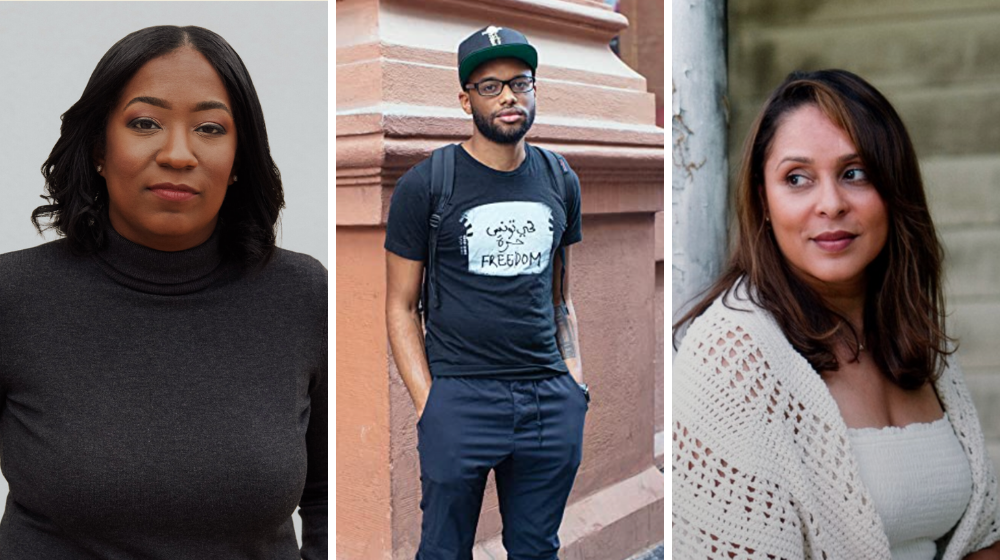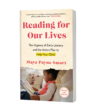By Maya Payne Smart
Austin may be known for live music and technology show stoppers ACL and SXSW, but the quieter, gentler TBF stole my heart when I landed in Texas. Within weeks of moving to town, I signed up to volunteer with the Texas Book Festival’s Reading Rock Stars program, which brings authors to Title I schools and gives each child a book, sometimes the very first they’ve ever owned. And within a few months I joined the festival’s board and served for four years.
This year the Texas Book Festival celebrated its 25th anniversary in grand fashion, with two weeks of stellar virtual programming amid a pandemic. And while the warmth and energy of in-person book events doesn’t translate via Zoom, I can attest—based on my experience hosting conversations with Pulitzer Prize-winner Natasha Tretheway and PEN/Hemingway award-winner Yaa Gyasi—that virtual conversations bring an intimacy and power all their own.
Here are four festival author reflections from 2020 that I won’t soon forget:
Natasha Tretheway, author of Memorial Drive, on Revisiting Subjects
“A lot of great writers have told us, like Faulkner, the past isn’t dead, it isn’t even past. Or, Baldwin, people are trapped in history and history is trapped in them. I think that that’s absolutely true. In many ways we are in our traces, in the loop of this history . . . at the same time that we’re trying to advance forward, we keep circling back to some difficult moments. I think we’ve seen that in recent years, with the rise of vocal, visible, and more virulent forms of white supremacy that have been given a platform. If people thought that that was behind us, I think that what we are seeing is how much we’ve circled back to it and that the reckoning with it is still yet to be done . . .
“There are innumerable ways to approach these subjects. That’s why we continue to have books about the Civil War. It’s seemingly inexhaustible in terms of what it can tell us, not only about the past, but where we’re headed. Each new lens gives us a new way of understanding ourselves as Americans.
“As I was sitting down to work on this book, Memorial Drive, there would be moments that I would have to stop writing prose and turn the page over, because something was coming out as a poem instead. . . . The newer poems in my last book, Monument, which was my first retrospective, grew out of writing about my mother and our history in prose, but needing to stop because some of it came out as poems. And the things that come out as poems approach the subject from various and different angles.
“And to go the other way, from my very first book of poetry, Domestic Work, I was writing about this place, my mother’s extended family, things that happened to me as a child in Mississippi that come back as scenes in this book, but I have the opportunity to delve deeper into them in the prose and to look at the same situation in a very different way . . .
“It feels like palliative care, because the wounds can’t be reopened because they’ve not closed, they’ve not healed. The metaphor of palliative care works because that is what you do to a wound that can’t heal. You can keep it clean, you can do things to mitigate the pain, and you can keep it exposed to light. That’s what I do. And I think that returning to investigate, to write out of those particular wounds, is a form of palliative care. And I go back to the words of the poet Rumi, the wound is the place where the light enters you. And so it is a place that is, though painful, both defining and necessary. I think it gives me a particular kind of vision.”
Brit Bennett, Author of The Vanishing Half, on Empathy in Characterization
“I’m interested in representing a fictional world that’s as diverse as our actual world. And also, I’m interested in representing it in a way in which that diversity is not a conflict. That’s not to say that characters are not facing conflicts based on who they are. Obviously, that’s a big part of the book.
“But one of the things I wrote down going into this was that I didn’t want these characters’ identities to be problems that the story has to solve. To me that’s a different thing than characters facing the problem, for example, of racism or misogyny or transphobia. That is a problem, but being transgender is not a problem, being a black person or being a woman is not a problem. So to me, that was the distinction that I wanted to write toward.
“I think that’s more interesting. I think that there can be these really easy and simplistic ways that we have of thinking about identity, where if you’ve introduced a character who’s like this, then this conflict needs to arise from that. To me, it’s just boring. That was less interesting to me than, okay, now you have these two people, how are they going to work out their issues that are not about ‘this person has this type of body or this person has that type of body,’ but their issues about other things that you just struggle with as a person. So to me, those were some of the things that I’ve thought about . . .
“I think empathy also is just more interesting than bigotry. I think empathy is always more interesting than bigotry. Part of it was again of how I want to see the world and how I want to create a fictional world, but the other part of it is, yeah, it’s more interesting to write a character who has empathy than a character who is a bigot. I just think bigotry is very boring. So those were some of the things that I was thinking about in crafting the world, but I just wanted the world to look, to feel as diverse as our world is.”
Mychal Denzel Smith, author of Stakes is High, on Finding and Sustaining Hope
“The abolitionist organizer Mariame Kaba would say, hope is a discipline. It’s something that you cultivate every single day and it’s done by engaging in the work. Because it’s easy to look out and to be cast into despair because it’s like, What? We’re not winning.
“But when you are looking and you are in community with people who are committed to the work at the same level you’re committed to the work, and you’re getting little victories here and there, the hope is ingrained in you, because you understand that maybe you’re not winning the whole thing today. Maybe you’re not even winning the whole thing in your lifetime, but you’re doing something that’s setting the groundwork. You are becoming a good ancestor. You are giving future generations this ability to, when they look back at the history, to say, no, it’s not that—as we do now with every racist, every rapist—they were a person of their times.
“We don’t have to look back and say, Donald Trump was just a person of his times. We get to say there were other people who lived through that moment, and they fought and they fought back, and they were tenacious, and they did everything that they could in their power to ensure that the world that the Donald Trumps and everyone who follows him wants to come to pass, it doesn’t have to be. You do that and you engage in that and you find your people. You find the people that you are aligned with and grow that coalition and keep finding more people, and you build community, and you find these love connections with people to be able to sustain you.”
Yaa Gyasi, author of Transcendent Kingdom, on Writing about Addiction and Depression
“I think starting with the science really helped. Gifty [the protagonist] . . . the research that she does is modeled on the research that my friend does, and reward-seeking. Before I started researching this novel, I hadn’t really ever thought about things like addiction and depression as existing on this one spectrum. But through this work, one thing that came up for me was this idea that they both involve reward-seeking circuits of the brain. So with addiction, the animal continues to seek reward even when there’s great risk involved. And with depression, the animal cannot seek reward, even though there’s pleasure despite any risk. Once I kind of thought about these two things as existing on this spectrum, it helped me to enter into it.
“But the other piece of the research, beyond the science, was just talking to people, reading as much as I could from firsthand accounts of people who had struggled with this kind of major depressive episode. I think that was really moving and also really helpful. But it is something that’s difficult to write about.
“The other thing that helped is that I wasn’t writing it from the perspective of Gifty’s mother. That would have been another layer of difficulty to try to get into what she was feeling from that kind of lived experience. This way I’m seeing around it. I’m seeing it through the eyes of Gifty, who’s experiencing it as a caretaker, which I think is obviously a very different experience than experiencing it for oneself . . .
“I was thinking a lot about how culture and mental health are so intertwined. And how we witness or experience these illnesses has so much to do with the communities that we grew up in. Even that opening . . ., what you’re witnessing is Gifty’s shame and fear around seeing this man. But she describes the fact that nobody in the market seems afraid. Nobody in the market seems disgusted. Nobody’s parting the waters for this man to walk through. At some point, she says something like, his presence was weather, it wasn’t a thunderstorm, it was like a cloud on an otherwise sunny day.
“For me, that way of bringing in the way that other people experience or think about these different issues, the language and vocabulary of these communities for talking about things like depression and addiction, was just one way to see how culture and, specifically, mental health are deeply, deeply intertwined.”



